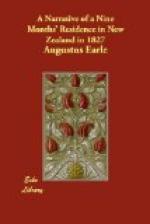On entering a village, a stranger instantly discovers which portion of its inhabitants are the slaves, though both the complexion and the dresses of all are alike. The free Zealander is a joyous, good-humoured looking man, full of laughter and vivacity, and is chattering incessantly; but the slaves have invariably a squalid, dejected look; they are never seen to smile, and appear literally half starved. The beauties characteristic of a New Zealander are his teeth and hair; the latter, in particular, is his pride and study; but the slaves have their heads half shorn. The male slave is not allowed to marry; and any intercourse with a female, if discovered, is generally punished by death. Never was there a body of men so completely cut off from all society as these poor slaves; they never can count, with certainty, on a single moment of life, as the savage caprice of their master may instantly deprive them of it. If, by chance, a slave should belong to a kind and good master, an accident happening to him, or any of his family, will probably prove equally fatal to the slave, as some are generally sacrificed on the death of a chief.
Thus these poor slaves are deprived of every hope and stimulus by which all other classes and individuals are animated; no good conduct of theirs towards their master, no attachment to his person or family, no fidelity or long service can ensure kind treatment. If the slave effect his escape to his own part of the country, he is there treated with contempt; and when he dies (if a natural death), his body is dragged to the outside of the village, there to be made sport of by the children, or to furnish food for the dogs! but more frequently his fate is to receive a fatal blow in a fit of passion, and then be devoured by his brutal master! Even the female slaves who, if pretty, are frequently taken as wives by their conquerors, have not a much greater chance of happiness, all being dependent upon the caprice of their owners.
When I can relate anything favourable to the missionaries, I invariably intend to do so, which will account for the introduction of the following: A few days since, I paid a visit to one of their settlements, and noticed a remarkably fine native woman attending as a servant. She was respectably dressed, and in every respect (except complexion) she was similar to a European. She spoke English fluently. Upon expressing my admiration of her, I was informed that this woman had been a slave of Hongi’s, and that about a year previous he had lost one of his sons, and had determined to sacrifice this poor girl as an atonement. She was actually bound for the purpose, and nothing but the strong interference of the whole of the missionary society here could have saved her life. They exerted themselves greatly, and preserved her; and she had proved a faithful and valuable servant.
CHAPTER XXX.
Piratical seizure of A vessel.




